Speed Stars Shatter World Records and France’s Phenom Stays Perfect at Seoul World Cup; Results and Thoughts
This article originally appeared on Climbing
We're only two competitions into the 2023 World Cup circuit and already we've had enough show-stopping moments to send the Internet into a frenzy. Many of those jaw-dropping, viral feats took place at this past weekend's World Cup in Seoul, which featured Speed and Boulder disciplines contested at the lush climbing enclave of Yongma Waterfall Park.
Here's a recap of all the action, along with some results and random thoughts on the excitement...
Speed records fall as circuit veterans shine
Some of the most significant moments of the entire World Cup event took place in the Speed qualification portion. Particularly, both the men's and women's world records were bettered over the course of the proceedings. Indonesia's Veddriq Leonardo set the tone early in the men's division by clocking a historic time of 4.98 seconds--besting the previous world record (held by his Indonesian teammate Kiromal Katibin) by 0.02 seconds, and being the first climber in history to officially go "sub-5."
The mammoth performance in the qualification portion put Leonardo atop the standings heading into the finals, where he soon put on one of the most impressive performances in the history of the Speed discipline. First, Leonardo beat France's veteran star Bassa Mawem, and then he beat China's Peng Wu in another world record-setting performance (with a time of 4.90 seconds). It seemed only fitting that Leonardo would carry such momentum into ensuing victories over China's Xinshang Wang and, eventually, Jinbao Long in the big final. It wasn't the smoothest run for a climactic race--a stutter near the top almost proved costly for Leonardo, but he stayed composed and cruised to a gold medal. Long was awarded the silver, and Wang the bronze for a small final win against compatriot Jianguo Long.
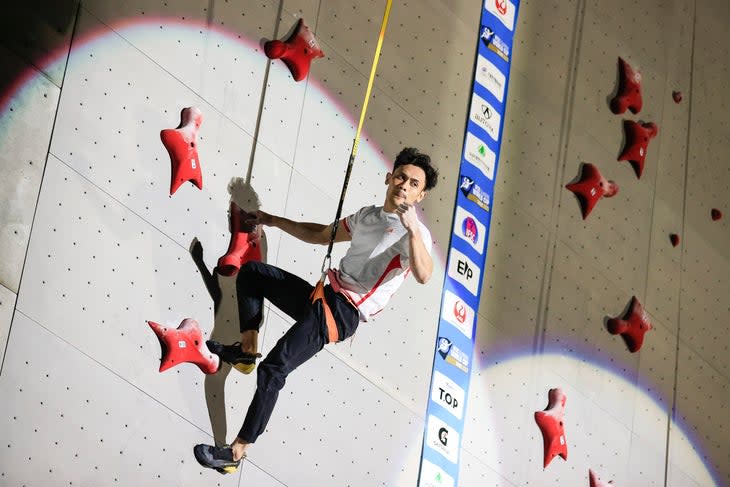
In the women's division, Poland's Aleksandra Miroslaw made history by shattering her own world record--twice!--in the qualification portion. She first clocked a time of 6.46 seconds (improving on her previous world record by 0.07 seconds), and then notched a new world record of 6.37 seconds.
Those extraordinary times were harbingers of a masterful final round from Miroslaw. She came from behind in the earliest race of the bracket to beat Ecuador's standout Andrea Rojas, and rocketed to victory against South Korea's Jimin Jeong. But the best was yet to come, as Miroslaw then set another world record (6.35 seconds) in a close race against Indonesia's Desak Made Rita Kusuma Dewi and--as the zenith of it all--one more world record (6.25 seconds) in the big final race against Polish teammate Natalia Kalucka. The podium, with Miroslaw as the gold medalist, Kalucka as the silver medalist, and Made Rita Kusuma Dewi as the bronze medalist, was a perfect encapsulation of the event's biggest stars; in fact, Made Rita Kusuma Dewi had one of the most riveting finishes when she beat Kalucka in the dyno to the buzzer during the small final. But nobody shined brighter than Miroslaw, who has now broken her own world record six times.
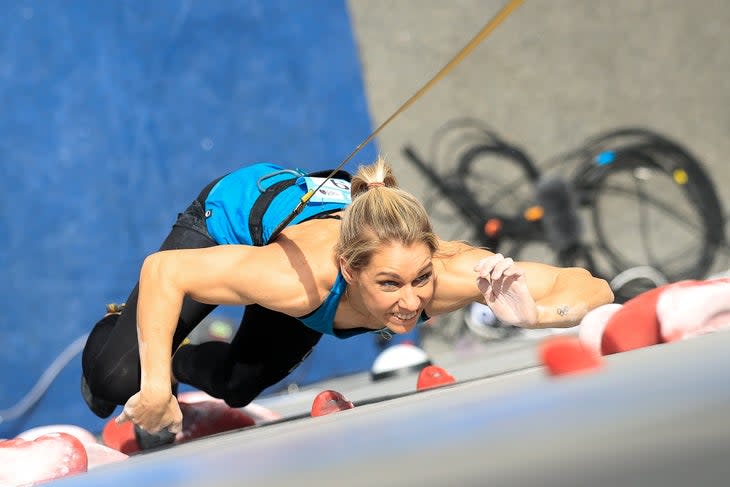
Schalck is golden again; Nonaka returns to old form
The boulder portion of the World Cup was marred by heavy rain and, as a result, a reworked schedule. But that didn't stop Israel's Ayala Kerem from rolling through the qualification round of the women's division. Kerem was the only woman to top all five qualification boulders, chased closely by a number of other women who managed to top four qualification boulders (Germany's Lucia Dorffel and Hannah Meul, Serbia's Stasa Gejo, and Team USA's Natalia Grossman among them).
But in the semi-final round (that ultimately resulted in final standings, due to the persistent rain), Kerem's struggles on an inaugural slab boulder proved costly. Kerem couldn't find a crucial wedged position to reach a zone hold; Japan's Miho Nonaka and France's Oriane Bertone, on the other hand, were among the competitors that successfully worked through the slab's dual-tex puzzle and secured tops. This jumpstarted a dual between Nonaka and Bertone that continued for the rest of the round. Nonaka gained the edge by securing a zone on the second boulder and a top on the third boulder, a coordination romp up boomerang-shaped edges. Nonaka failed to snag a top (or zone) on the last boulder, which left an opening for several other competitors; Kerem, for example, brought the competition down to the wire attempting to land that boulder's low, dynamic cross move. But, ultimately, Nonaka's total of two tops and a zone were enough to earn the gold medal and hold off eventual silver-medalist Bertone and Team USA's Brooke Raboutou (the bronze medalist), each of whom finished the event with two tops.
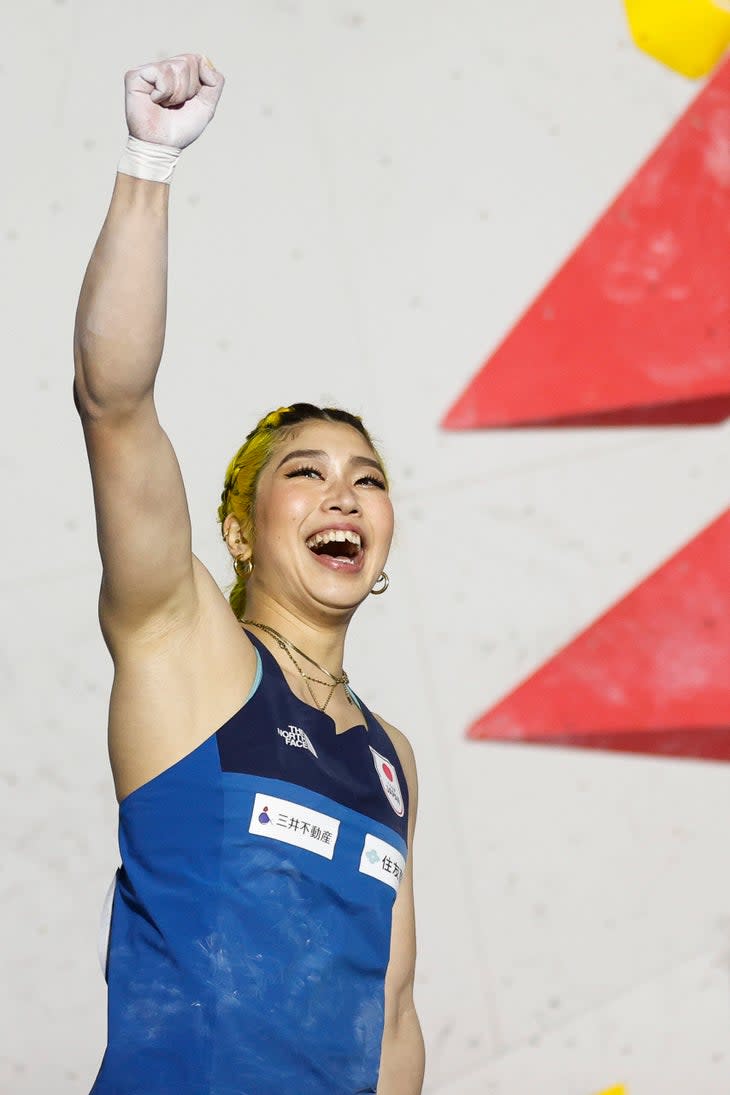
A rain-postponed men's qualification round was highlighted by a bottleneck at the top of the scores, with France's Mejdi Schalck, South Korea's Dohyun Lee and Jongwon Chon, Japan's Kokoro Fujii and Tomoa Narasaki, France's Manuel Cornu, and others securing four tops.
However, the men's standings separated quickly in the semi-final round (which, again, ultimately resulted in final standings): Only Schalck, Narasaki, and Cornu were able to work through the cruxy one-legged perch of the round's opening slab boulder. Jongwon Chon's sole top of the second boulder--a stiff journey across two-finger pockets--put some pressure on Schalck and Narasaki. But a crucial flash on the third boulder put Schalck in front. A dud of a fourth boulder (with no tops and no zones) did not alter the standings, so Schalck was awarded the gold medal, with Narasaki trailing for the silver and Chon earning bronze. It did not amount to the most exciting final round (er...semi-final round with final standings), as all those aforementioned men on the podium secured two tops. But it still established the most exciting storyline thus far for the boulder season, which is 18-year-old Schalck now having won two World Cups in a row.
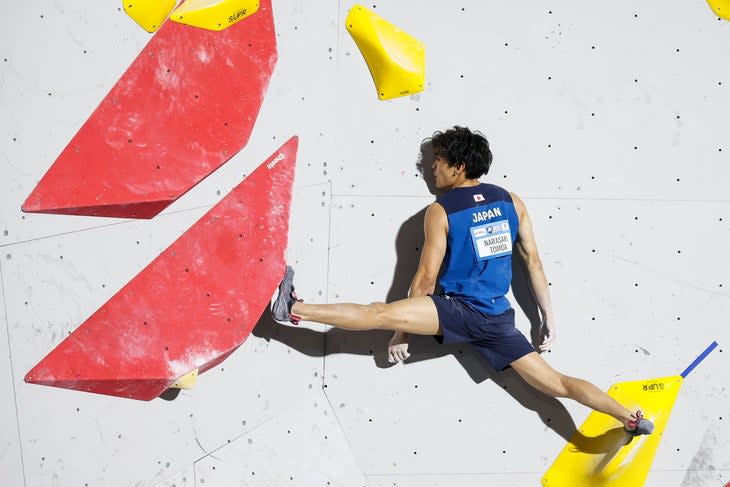
Takeaways from the Seoul World Cup:
1.Let's turn back to all the Speed action for a moment. At this time last season, the men's Speed world record was 5.20 seconds and held by Veddriq Leonardo. Consider the many times that that men's world record was broken in the course of this past year: 5.17 seconds (by Kiromal Katibin in Seoul), 5.10 seconds (again by Katibin, in Salt Lake City), 5.09 seconds (again by Katibin, in Villars), 5.04 seconds (again by Katibin, again in Villars), 5.00 second (again by Katibin, in Chamonix), and finally these sub-5 marks by Leonardo in Seoul to kick off this season. In terms of smashing records, it has been total domination by Indonesian teammates Leonardo and Katibin.
2. The fact that Aleksandra Miroslaw was so casual in breaking her own women's world record at this event--from 6.37 seconds to 6.35 seconds and finally to 6.25 seconds--makes me think we'll see her continue to chip away at the world record this season. That's not to say that someone else in the women's division couldn't slip in there and notch a historic time (Natalia or Aleksandra Kalucka, for example). But Miroslaw was clearly in an echelon all her own at this event, and any other woman will have to have the run of a lifetime to clock a world record time that Miroslaw seems capable of doing so nonchalantly.
3. Let me also reiterate something that Matt Groom said on the IFSC's broadcast: Miroslaw has not missed out on a Speed final round for any competition that she has been a part of since 2013! So, not only does Miroslaw have world records to her name, but she also has some of the best consistency that we've ever seen in the women's Speed division.
4. American Speed fans should note that Team USA stars Sam Watson and Emma Hunt had record-setting performances. Watson set a new men's American record of 5.02 seconds in the men's division (and, ultimately, a 9th place finish) and Hunt solidified a new women's American record of 6.82 seconds (and a 7th place finish). They probably each would have liked to place much higher in the results, but those stellar times should be indicators that they are both in prime form as this season gets rolling.
5. A tip of the hat goes to France's Bassa Mawem. Not only is he 38 years old, but he is also a couple of years removed from a horrific bicep tear that forced him to withdraw from the Tokyo Olympics. And yet, he is still advancing to final rounds in the men's Speed division. Bravo!
6. While we're on the subject of Mawem, his qualification race against Italy's Matteo Zurloni was about as close as a Speed race can be: Mawem clocked a time of 5.431 seconds, while Zurloni clocked 5.430 seconds.
7. This was the second year in a row that bad weather has been a major plot point in the Seoul Boulder World Cup. The Yongma Waterfall Park is an absolutely stunning outdoor venue with its namesake waterfall, its forested sections, and its expansive climbing area, but it might be time to consider moving the Seoul World Cup to an indoor venue.
8. Miho Nonaka's last Boulder World Cup gold medal, prior to this one in Seoul, was in 2018. She has had a lot of ups and downs since then--including major shoulder injuries, a spot on the Tokyo Olympics' podium, and victories at events like the World Games. But suffice to say, this was the first time in a while that it felt like we were seeing vintage Miho on the wall: Powerful, poised, and consistently supreme.
9. Few moments in a World Cup are as exciting as a hometown favorite securing a top. To that point, Jongwon Chon's flash of the second men's boulder in the semi-finals, as well as Korean teammate Dohyun Lee's top of the third men's boulder, were undoubtedly highlights for the drenched crowd.
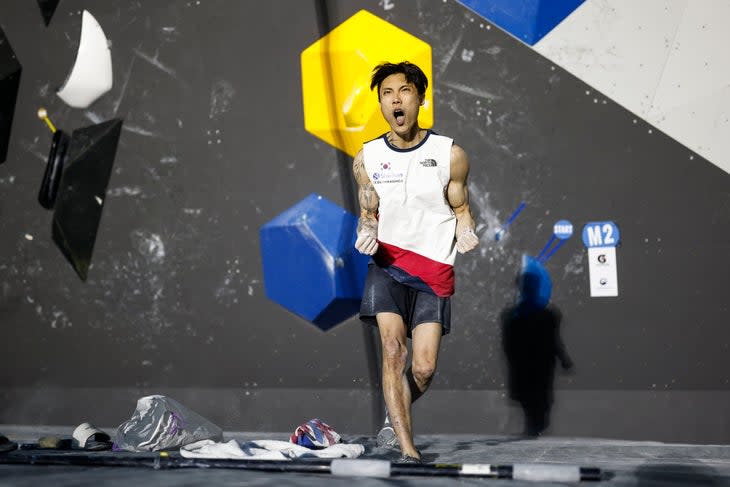
10. If I had more free time on my hands, I'd make a compilation video of Alannah Yip's gasps on commentary. They're the best! See Ritsu Kayotani's fall off the balance perch on the first men's boulder in the semi-finals, or Hannes Van Duysen's miss of the dyno on the fourth men's boulder for some prime audio examples.
11. You have to feel for Team USA's Natalia Grossman. She had a bad, whiplash fall during the qualification round, which tweaked her neck. Then she had a long fall with a crumpled landing while throwing unsuccessfully for the top hold of the second women's boulder in the semi-finals. She was visibly wincing on the mats after that--and anytime an athlete is wincing as a result of neck pain, it's not good.
12. The same goes for Japan's Kokoro Fujii, who had an elbow injury that was bad enough to result in a withdrawal from the semi-final round (after finishing near the top of the qualification round). Let's hope that Fujii and Grossman--both perennial superstars of the circuit--heal up quickly.
13. We finally have a term for Brooke Raboutou's trademark use of a bolt-hole as a foothold: "The Rabitoe," as coined by Alannah Yip on commentary. Let's go with it!
14. The American men did slightly better at this World Cup than they did at last week's World Cup in Hachioji, in that Sean Bailey advanced to the semi-final round here in Seoul. But the rest of the results were as follows: Colin Duffy placed 31st, Jesse Grupper placed 45th, Dillon Countryman placed 47th, and Ross Fulkerson placed 84th. I'm not ready to say the results--through the first two boulder World Cups--have been troubling, but they've definitely been at a lower standard than we've come to expect from the stellar American men's squad.
Results
Boulder
Men (Top six from the semi-final round)
Mejdi Schalck (FRA)
Tomoa Narasaki (JPN)
Jongwon Chon (KOR)
Dohyun Lee (KOR)
Manuel Cornu (FRA)
Nicolai Uznik (AUT)
Women (Top six from the semi-final round)
Miho Nonaka (JPN)
Oriane Bertone (FRA)
Brooke Raboutou (USA)
Anon Matsufuji (JPN)
Annie Sanders (USA)
Ayala Kerem (ISR)
Speed
Men
Veddriq Leonardo (INA)
Jinbao Long (CHN)
Xinshang Wang (CHN)
Women
Aleksandra Miroslaw (POL)
Natalia Kalucka (POL)
Desak Made Rita Kusuma Dewi (INA)
For exclusive access to all of our fitness, gear, adventure, and travel stories, plus discounts on trips, events, and gear, sign up for Outside+ today.

